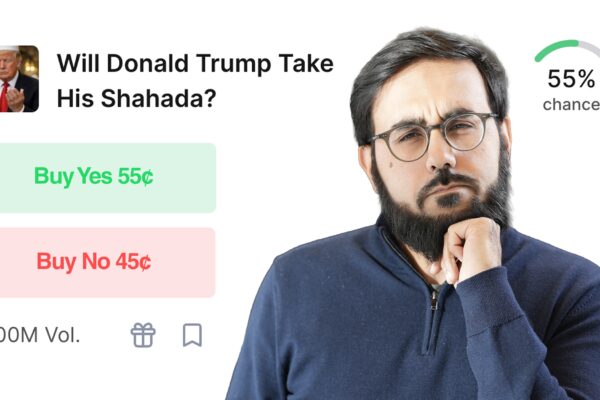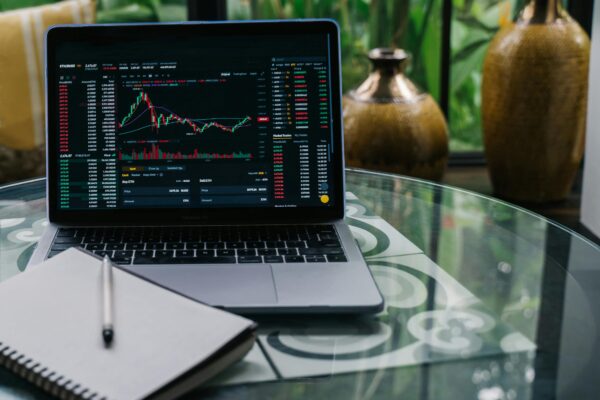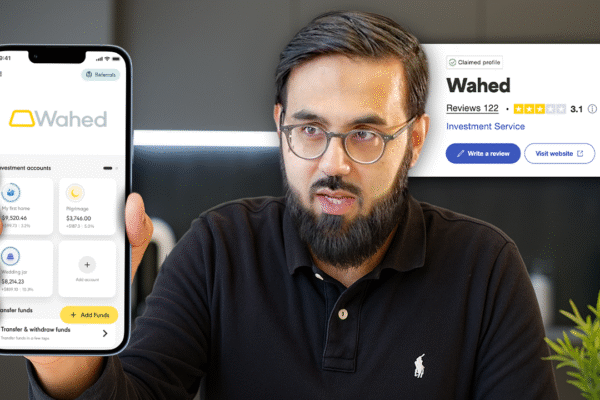
Are Prediction Markets Halal or Haram? The Truth About Polymarket & Kalshi
06 February 2026 7 min read


Adil Hussain
Head of Content
5 min read
Last updated on:
If you’ve checked the markets lately, you’ll know it’s not pretty.
Trump’s tariffs have caused mayhem, and the fallout has been brutal. Stocks are sliding, crypto’s in freefall, and investors worldwide are watching their portfolios bleed red.
But here’s the reality: this is par for the course when it comes to equities.
Markets are built on cycles of calm and chaos.
During times of global crises, volatility (sharp rises and falls in prices over a short period) spikes. And honestly? This is the price you pay for the potential of higher long-term returns. Volatility is baked into the deal – it’s what fuels the growth, if you can stomach the ride.
But maybe this recent turmoil has been a wake-up call.
Maybe you’ve realised that, while others are riding the storm, you’re losing sleep at night. And that’s okay. The truth is, successful investing isn’t about forcing yourself to fit someone else’s strategy — it’s about knowing your own psychology.
If your portfolio is keeping you up at night, you’re more likely to make poor decisions when it matters most.
So if you’ve realised you’re not cut out for wild market swings, or you simply want to balance out the risk in your portfolio, it’s worth exploring lower-volatility halal options. These can offer you steadier, more predictable returns, and peace of mind.
And here’s the thing: these lower-volatility options aren’t just for safety. They can also add a healthy dose of diversification to your portfolio by spreading your risk across different asset classes and cushioning you against future shocks.
So in this article we will cover 6 halal lower-volatility alternatives focused on 3 main categories (gold, fixed-income and private markets).
Gold is our communities’ favourite investment and for good reason. Whether you hold it physically or through a Shariah-compliant ETF, it’s a timeless hedge during market downturns and turbulent periods. While gold isn’t immune to price movements, it has a well-earned reputation for holding its ground when other assets are under pressure.
Islamic fixed income investments usually comes in 4 different flavours:
Islamic savings accounts avoid interest (riba) and instead grow your money through halal investments ( typically funding home purchases or asset-backed deals).
Rather than paying guaranteed interest, they offer an Expected Profit Rate (EPR) based on returns from these activities. While EPR isn’t guaranteed, UK Islamic banks have an excellent track record of delivering it consistently. Plus, they only invest in halal sectors like property and commodities, steering clear of prohibited industries like alcohol, tobacco, and gambling.
Islamic savings accounts in the UK typically pay between 0.5-4% and are also backed by the FSCS £85k guarantee per account.
Sukuk are the halal alternative to conventional bonds. Instead of earning interest (which is haram), you’re effectively buying a share in an asset and receiving rental-style income from it. Like bonds, Sukuk offer regular, predictable payments and are often backed by reliable institutions, giving you steady returns without compromising your values.
Sukuk provides regular, stable income backed by real assets and are considered a reliable way to diversify away from volatile stocks and crypto.
Property is one of Muslims’ favourite investments — and for good reason. It offers the reassurance of a tangible, physical asset and the potential for steady rental income or development profits. This includes property funds or direct exposure to property development deals, giving you the benefit of rental yields or fixed returns from development profits — all without the hassle of managing properties yourself.
While property isn’t completely insulated from economic ups and downs, it provides regular income backed by real assets and is a trusted way to diversify your portfolio away from more volatile investments like stocks and crypto.
We regularly invest in real estate over at Cur8 Capital, which you can learn more about here. Our latest deal focuses on high-quality, income-generating healthcare properties, leased to trusted operators with rental income largely backed by the NHS.
The third flavour is a niche but growing area of Islamic Finance, focused on supporting businesses through working capital and trade finance solutions. In simple terms, you’re helping real businesses fund their day-to-day operations or finance the purchase and sale of goods — with the underlying assets or transactions themselves acting as security. It’s a highly practical, Sharia-compliant investment route that avoids speculation and focuses on fuelling genuine economic activity.
If this sounds interesting, our USD Income Fund is a specialist fund doing exciting work in this space. You can learn more about it here.
Private companies (especially those in essential sectors like pharmacies or healthcare services) are less exposed to the daily drama of public markets. While they aren’t completely insulated from economic pressures, they’re less likely to be directly affected by short-term market turmoil. Cur8 has recently launched a private equity strategy focused on pharmacies which you can learn more about here.
If there’s one lesson this current market turmoil is teaching us, it’s this: diversification is essential and not just a nice-to-have.
When you invest heavily in just one asset class or region (like US equities, for example), your portfolio becomes highly vulnerable to specific risks. And as we’ve seen in recent months, even markets once considered stable can quickly become unpredictable.
Diversification spreads your investments across different types of assets and sectors, so that when one area struggles, others help cushion the blow. Fixed income, gold, property, and private equity in essential services like healthcare all behave differently in times of crisis. This mix doesn’t guarantee you won’t see dips, but it does give your portfolio balance and resilience.
It’s also about psychological safety.
Knowing you’re not overexposed to a single volatile asset means you’re less likely to panic when markets swing. And as we always say at IFG, your investing strategy should suit your temperament — because if your portfolio keeps you awake at night, you’re more likely to make rash decisions.
Ultimately, diversification helps you stay the course, ride out market storms, and invest with confidence, no matter what’s happening in the headlines.
In the short term, it’s rarely wise to panic-sell your stocks. Reacting emotionally to market swings often does more harm than good, and long-term investors know that temporary dips are part and parcel of the journey. But looking further ahead, there’s a clear trend emerging: the US market, once seen as a pillar of stability, has become increasingly unpredictable over the last few months.
The writing is on the wall with smart investors globally starting to diversify away from overexposure to the US, in search of safer, more balanced portfolios that can weather future shocks.
This is where those lower-volatility, diversified halal investments come into their own.
If you want to learn more about halal investing and how to build a diversified portfolio, download our free Halal Investment Checklist; it’s a practical, step-by-step tool to get you started.

06 February 2026 7 min read

26 August 2025 7 min read

24 July 2025 15 min read
Leave a Reply